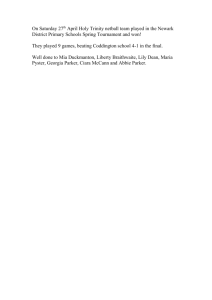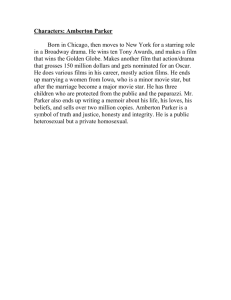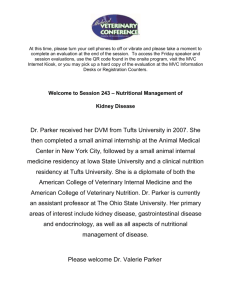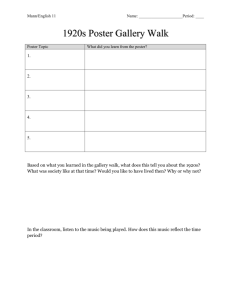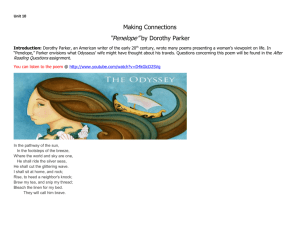Introduction to Critical Theory Instructor: Simon Ferrell Course
advertisement
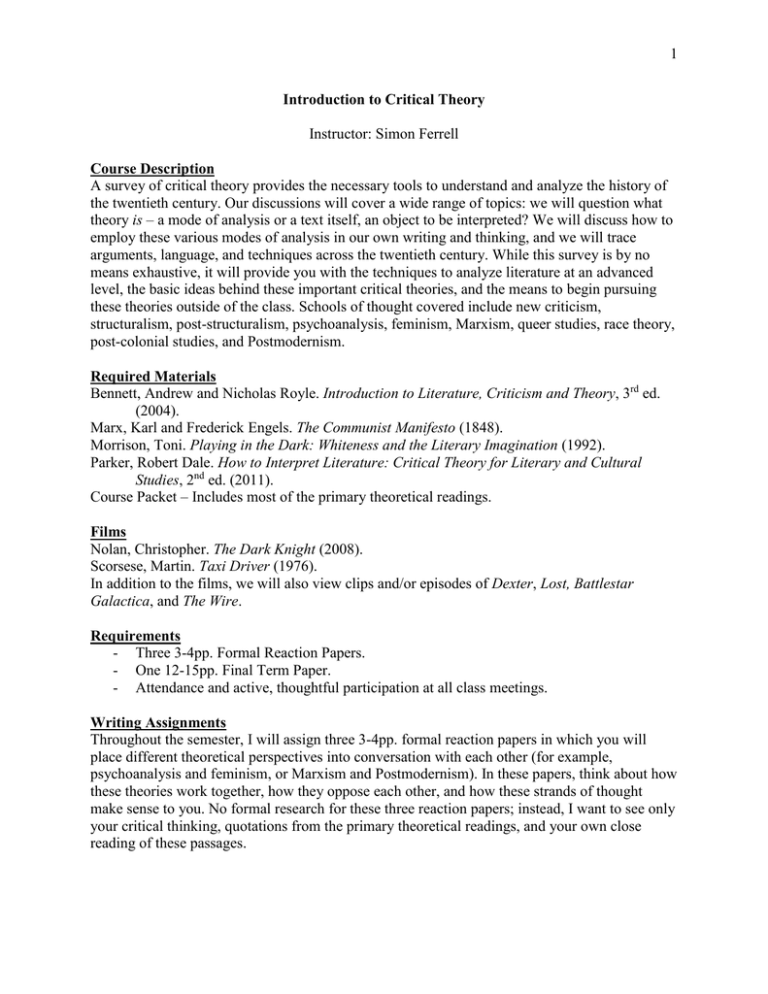
1 Introduction to Critical Theory Instructor: Simon Ferrell Course Description A survey of critical theory provides the necessary tools to understand and analyze the history of the twentieth century. Our discussions will cover a wide range of topics: we will question what theory is – a mode of analysis or a text itself, an object to be interpreted? We will discuss how to employ these various modes of analysis in our own writing and thinking, and we will trace arguments, language, and techniques across the twentieth century. While this survey is by no means exhaustive, it will provide you with the techniques to analyze literature at an advanced level, the basic ideas behind these important critical theories, and the means to begin pursuing these theories outside of the class. Schools of thought covered include new criticism, structuralism, post-structuralism, psychoanalysis, feminism, Marxism, queer studies, race theory, post-colonial studies, and Postmodernism. Required Materials Bennett, Andrew and Nicholas Royle. Introduction to Literature, Criticism and Theory, 3rd ed. (2004). Marx, Karl and Frederick Engels. The Communist Manifesto (1848). Morrison, Toni. Playing in the Dark: Whiteness and the Literary Imagination (1992). Parker, Robert Dale. How to Interpret Literature: Critical Theory for Literary and Cultural Studies, 2nd ed. (2011). Course Packet – Includes most of the primary theoretical readings. Films Nolan, Christopher. The Dark Knight (2008). Scorsese, Martin. Taxi Driver (1976). In addition to the films, we will also view clips and/or episodes of Dexter, Lost, Battlestar Galactica, and The Wire. Requirements - Three 3-4pp. Formal Reaction Papers. - One 12-15pp. Final Term Paper. - Attendance and active, thoughtful participation at all class meetings. Writing Assignments Throughout the semester, I will assign three 3-4pp. formal reaction papers in which you will place different theoretical perspectives into conversation with each other (for example, psychoanalysis and feminism, or Marxism and Postmodernism). In these papers, think about how these theories work together, how they oppose each other, and how these strands of thought make sense to you. No formal research for these three reaction papers; instead, I want to see only your critical thinking, quotations from the primary theoretical readings, and your own close reading of these passages. 2 For the final 12-15pp. term paper, employ a mode (or modes) of critical theory and analyze a text of your choice. Be accurate in how you use the theory, engage with passages and close readings of both your primary text and the theory with which you choose to analyze, and be careful to avoid “analogy thinking.” Instead, use the theory to illuminate something organic about the text. You must make use of at least seven of the assigned readings from the semester for this final term paper. As always, I am happy and available to help you at any point during the writing process. Come by my office during my office hours or make an individual appointment with me. Attendance and Participation Participation and attendance are of the utmost importance in this course. This is not a lecture course. You will be expected to participate actively in everything that goes on in the classroom, which means sharing your ideas, thoughts, and opinions. Participation accounts for 10% of your final grade. Missing class will affect your grade, and four absences will result in a failing grade for the course. Academic Integrity I expect academic integrity. If you are caught cheating on any assignment, quiz, etc, you will fail the work in question and, depending upon the circumstances, possibly fail this course. Such violations can even get you dismissed from the college. See attached statement on plagiarism. Additionally, no discrimination, of any kind, will be tolerated in this class. Unit Readings New Criticism Parker – “New Criticism” pp. 11-43. Bennett & Royle (B &R) – “The beginning.” Brooks – “The Language of Paradox” (CP). Structuralism & Semiotics Parker – “Structuralism” pp. 44-85. Saussure – “Nature of the Linguistic Sign” & “Binary Oppositions” (CP). Levi-Strauss – “The Structural Study of Myth” (CP). Barthes – “Myth Today” (CP). Post-Structuralism/Deconstruction Parker – “Deconstruction” pp. 86-111. B & R – “The author,” Narrative,” & “Readers and reading.” Barthes – “The Death of the Author” & “From Work to Text” (CP). Foucault – “What Is an Author?” & from Discipline and Punish (CP). Derrida – “Structure, Sign, and Play in the Discourse of the Human Sciences” (CP). Psychoanalysis Parker – “Psychoanalysis” pp. 112-47. B & R – “The Uncanny” & “The text and the world.” Freud – from The Interpretation of Dreams; from Three Essays on the Theory of Sexuality; from Beyond the Pleasure Principle (CP). Lacan – “The Mirror Stage” (CP). 3 Žižek – “How Did Marx Invent the Symptom?” (CP). View Taxi Driver. Marxism Parker – “Marxism” pp. 211-43. B & R – “Ideology.” Marx & Engels – The Communist Manifesto & “Alienated Labor” (pp. 131-36). Althusser – “Ideology and Ideological State Apparatuses” (CP). Horkheimer & Adorno – “The Culture Industry” (CP). Feminism & Queer Studies Parker – “Feminism” pp. 148-78. B & R – “Sexual difference,” “Desire,” and “Queer.” Haraway – “Persistence of Vision” (CP). Cixous – “Sorties” (CP). Butler – “Performative Acts and Gender Constitution” (CP). Rubin – “The Traffic in Women” (CP). Foucault – from The History of Sexuality, Vol. I (CP). Race and Postcolonial Studies Parker – “Postcolonial and Race Studies” pp. 270-313. B & R – “Racial difference,” “The colony,” and “Mutant.” Morrison – Playing in the Dark. Said – from Orientalism (CP). hooks – “Eating the Other” (CP). Anderson – from Imagined Communities (CP). Postmodernism B & R – “The postmodern.” Jameson – “Cultural Logic of Late Capitalism” & “Cognitive Mapping” (CP). Baudrillard – “The Precession of Simulacra” (CP). Lyotard – from The Postmodern Condition (CP). View The Dark Knight.
